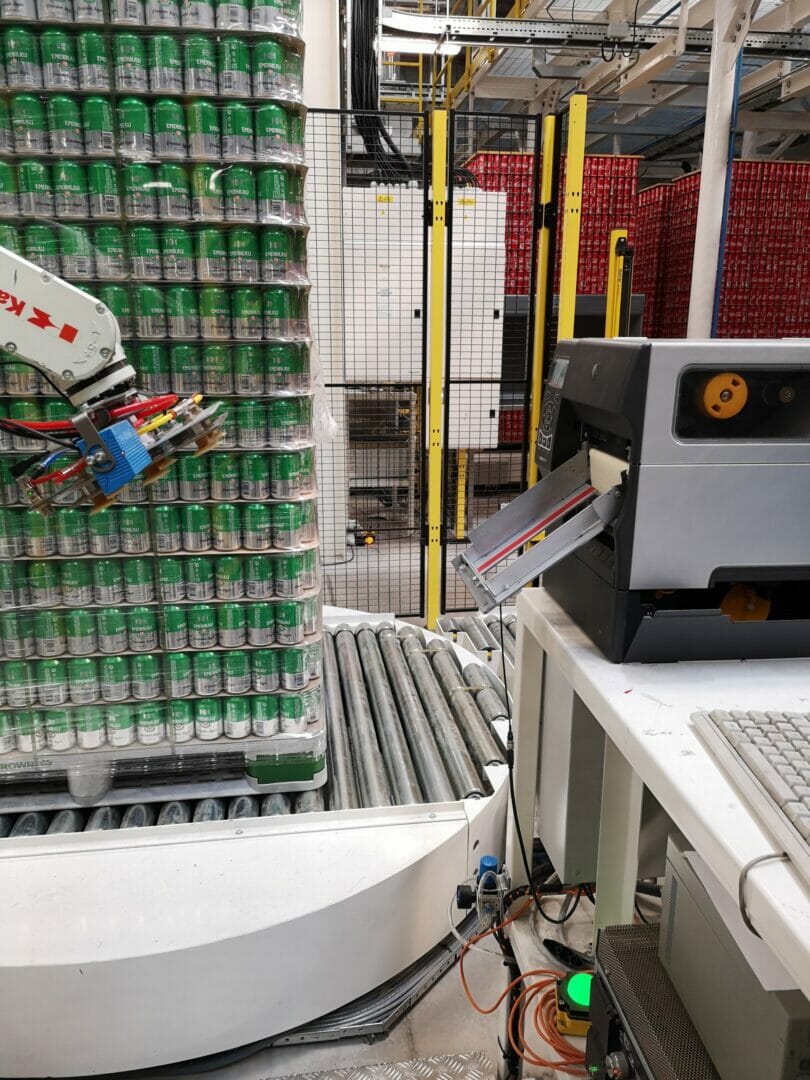Canned drinks are big business worldwide and the numbers involved are staggering. For example, just one of the better-known soft drink brands claims to sell 1.9 billion cans every day across the globe, and around 2.5 billion are produced annually in the UK alone. In the manufacturing and supply chain, getting the cans to the consumer makes use of proven processes that have evolved over time and which are constantly being refined as user demand and legislation changes.
With the food and drink industry being well recognised for its place at the forefront of innovation and development in the fields of automation, packaging and robotics, it is perhaps unsurprising that primary suppliers in the business have always been at the forefront of new automation technologies, methods and ideas. So, when one of the leading suppliers of cans to the drinks industry became aware of an opportunity to further improve on the quality of the service it delivers to customers, it seized it.
To avoid any possibility of contact between the cans and the adhesive labels that must be applied to every pallet dispatched to its customers, the company decided on a novel approach that would effectively reduce to zero the chances of it occurring. Embracing a fresh approach, it was decided to place the labels onto the retaining straps (which are 12mm wide) that secure the load, instead of directly onto the pallets themselves. To put the idea into practice, the company sought the guidance of a business they had relied on previously for packaging and automation engineering solutions, Blackstar Handling of Skelmersdale. Since the business was established more than 20 years ago by Managing Director Ian Pegler, Blackstar has become one of the UK’s foremost practitioners in the art of designing, making and installing fast, high-precision bespoke conveying and packaging solutions. It has customers across the UK and Europe, including household names such as Heineken, Kelloggs, Kimberley Clark and Heinz, in addition to this one producing cans for the drinks industry.
“This application was especially interesting for us, from an engineering viewpoint,” says Pegler. “Applying the label direct onto the strap, rather than onto the pallets themselves, was not in itself a major challenge, other than identifying the correct adhesive. But achieving the combination of the required speeds, position, precision and repeatability made us think very carefully about the best ways to automate the process.” According to Pegler, one of the key drivers behind the success of the Blackstar business has been as much to do with attitude as it has the engineering skills on tap. “This is how we came to work with Kawasaki Robotics in the first place,” he continues, “and why we have eschewed the approaches of other robot suppliers over the years. In simple terms, the teams at Kawasaki Robotics and Blackstar have a very similar outlook on how best to make a project work. Although we are well versed in the field of packaging and conveying, we have always enjoyed the advantage of Kawasaki Robotics’ specialist knowledge of robots and how to make them work best as part of our systems. We’re the experts in our fields and they are the experts in theirs, so when this new application emerged and revealed the need for robotic assistance, we didn’t even consider going anywhere else.”
For the Kawasaki Robotics team, their part of the new process involved supplying a robot (in this case, a standard RS-10N model) that would position the labels accurately, repeatedly, and on an unbroken 24-hour shift pattern, sometimes for months on end if required, and with minimal maintenance involved. Operating as part of the bigger package at Blackstar’s customer plants, the RS-10N applies two labels per pallet direct onto the retaining straps and typically works through sixty very large pallets an hour, or one every minute. The required accuracy on the project was for label placement to be within +/- 1mm in both the X and Y axes, with appropriate pressure to physically attach the label on contact: well within the capability of a robot that is supplied as standard from Kawasaki with a guaranteed accuracy of +/- 0.03mm when carrying a 10kg payload at a reach of 1450mm.
Pegler further states that an additional advantage of working with the Kawasaki team was that on this project Blackstar could also do away with using a PLC on the robot system, thus reducing costs and complexity, while also seeing efficiency improved. Working on a cycle time of 25 seconds per pallet for labelling, the RS-10N robot and system has thus far proved faultless. Almost 9,000 cans are contained on each of the hundreds of pallets being delivered by this Blackstar customer weekly and, to date, not a single instance of can/label contact has been reported.
Commenting on the continued success of its relationship with Blackstar Handling and their ordering of yet another of its robots, Kawasaki Robotics Sales Manager Ian Hensman says: “Once again, we have delivered much more than just a robot to a key customer. We have been privileged to enjoy a long-standing relationship with Blackstar that sees practical, workable and cost-efficient customer solutions offered as part of the wider Blackstar proposition. The combined knowledge and understanding of the two teams working in parallel has brought real operational and commercial benefits to Blackstar and its customers.”





